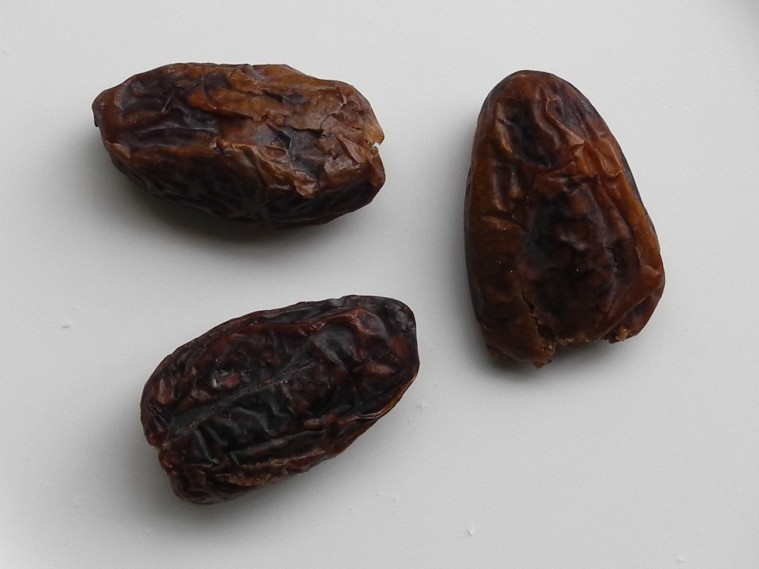My first introduction to dates was in the movie Indiana Jones: Raiders of the Lost Ark. The cute little capuchin monkey eats them and then dies because they have been poisoned. I am not going to lie: as a young child this scared me a bit, and I did not want to touch dates at all.
However, dates are very good to eat. They are delicious and nutritious. “Apart from the delightful flavor, they are incredibly healthy and confer a tremendous amount of health benefits on your body. They are a rich source of healthy fiber, minerals, and vitamins and can help relieve painful constipation, diarrhea, and other intestinal complaints.” (Health Focus)
And this autumn is date season!
Dates are the fruit of palm trees. Varieties range from Medjool (a rich-tasting desert delight) to acai (a tropical palm fruit). The dates we see in the healthfood store are typically desert types.
Add three dates to a daily diet and these 5 things will happen!
1. Improve Digestive Health
Dates contain a bunch of soluble fibers. Soluble fiber is essential for good digestive health because it draws water into the digestive tract. This helps relieve constipation. The potassium found in dates can also treat upset stomachs and diarrhea. They are a digestive tract balancer that is symbolized by their brown color (brown foods are always great for digestion). And they also strengthen good bacteria in the stomach!
2. Treat and Prevent Anemia
Anemia is a common issue among most people. I have been anemic from time to time. Dates are an excellent source of iron, so they help treat iron-deficient anemia. Anemia can leave one feeling exhausted. Boost iron levels with this delicious fruit!
3. Bone, Blood and Immune System Health
Dates contain magnesium, manganese, and selenium. Diets rich in selenium are known to prevent cancer. These minerals are also necessary for keeping our bones and blood strong and healthy. Therefore, keep bones strong by adding a date or two to your diet. They taste great!
4. Energy Boost
Dates are filled with natural sugars. These natural sweeteners include fructose, sucrose, and glucose. This makes them a perfect afternoon snack if you need a quick energy boost. Skip the energy bar and eat a couple of dates instead. The fiber in these tasty treats keeps power up without the crash one would typically experience from any other sweet treat.
5. Heart Health
The potassium found in this small fruit package reduces stroke risk, and adding dates to your diet can lower LDL (low-density lipoprotein) cholesterol.
“If you have heart disease or you just want to keep your ticker healthy, you’ve probably heard the mantra already: “Watch your cholesterol!” The type that puts your heart at risk is LDL — the “bad” cholesterol.
It collects on the walls of your blood vessels, where it can cause blockages. Higher LDL levels put you at greater risk for a heart attack from a sudden blood clot that forms there.” (WebMD)
Consuming dates can lower this bad cholesterol and keep the heart safe!
Adding dates to one’s diet is an excellent way to obtain a whole bunch of health benefits with only a handful of sweetness.
“Ultimately, dates are good for overall health despite their fructose concentration. Even if your diet is a sugar-free one, devoid of high-fructose corn syrup, agave, honey, coconut sugar, and cane sugar, you probably still eat fruit, and dates are a fruit too, with loads of benefits. When picking out your dates, look for plump ones with unbroken, smoothly wrinkled skins, and avoid those that smell rancid or are hardened. Dried dates keep for up to a year in the refrigerator while fresh dates should be refrigerated in tight, sealed containers and can keep for up to eight months.” (One Green Planet)
You can learn more about the health benefits of dates in the video below!
Sources:
http://positivemed.com/2015/10/01/eat-3-dates-daily-and-these-5-things-will-happen-to-your-body/
http://healthyfocus.org/12-health-benefits-of-dates/
Dates and Your Health: the Ideal Food or a Sugary Nightmare?
http://www.webmd.com/cholesterol-management/ldl-cholesterol-the-bad-cholesterol



